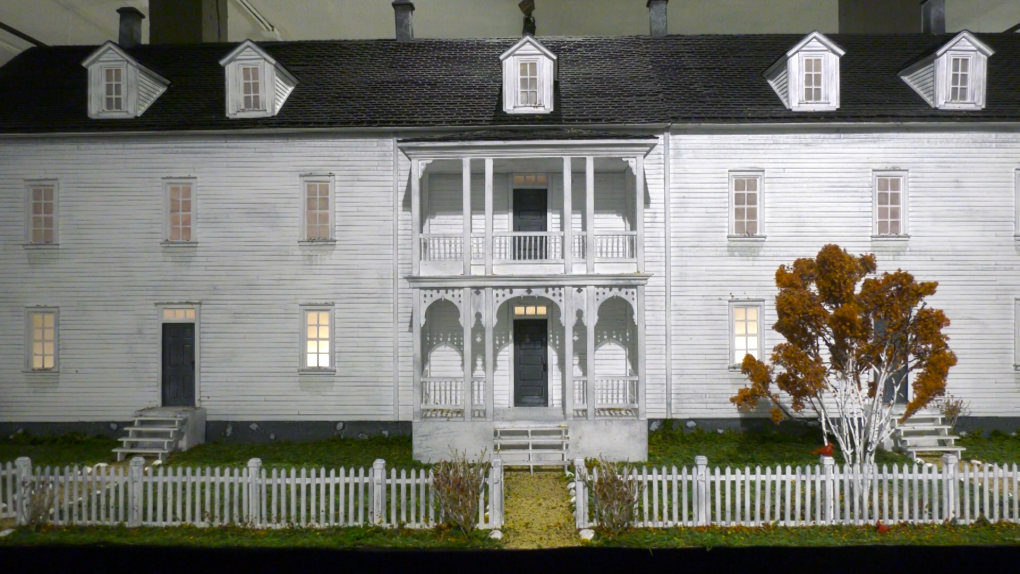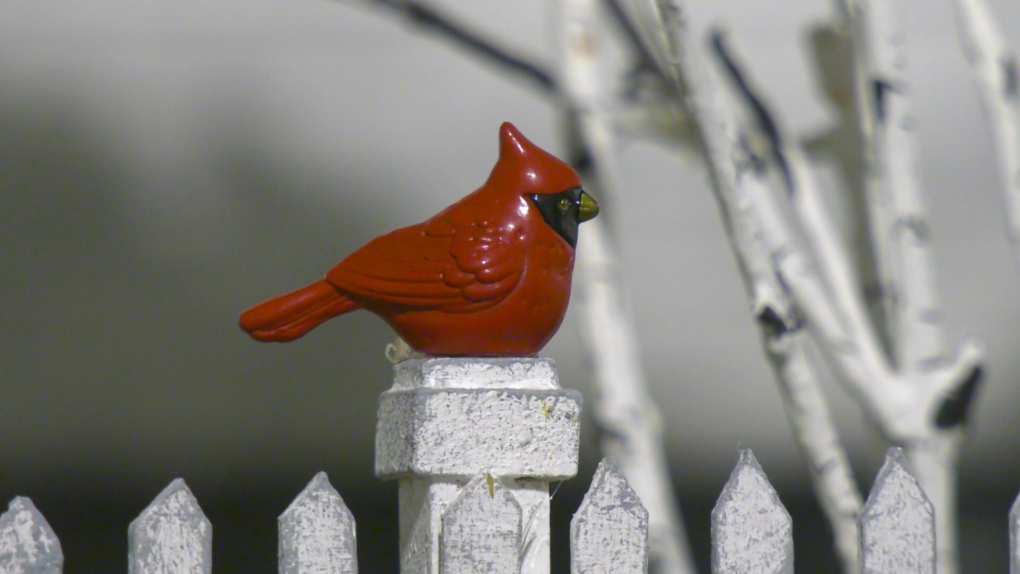Alberta artist hopes miniature replica of residential school will help with healing, reconciliation
 Artist Lance Cardinal next to his miniature replica of the St. Martin's Residential School. (Matt Marshall/CTV News Edmonton)
Artist Lance Cardinal next to his miniature replica of the St. Martin's Residential School. (Matt Marshall/CTV News Edmonton)
A miniature reminder of a large, dark part of Canada's history is opening the door for discussions on reconciliation and healing.
For years, local Indigenous artist Lance Cardinal had a vision for an art piece, a miniature replica of a residential school.
"This school here, St. Martin's, was the first residential school in my community," Cardinal said. "It's the school that both of my grandparents went to … this is where they met, this is where they were married and this is where they went to school."
The school opened in Desmarais-Wabasca in 1901, with the building being replaced in 1930.
"What I love most about this piece is you can actually squat down and see the perspective of what those kids would have seen walking into this massive space," Cardinal said. "In the front of the building we have this orange birch tree here and this is representing all the students who went to the school, and the memory of those students who never made it home."
 Part of a miniature replica of the St. Martin's Residential School by artist Lance Cardinal. (Matt Marshall/CTV News Edmonton)
Part of a miniature replica of the St. Martin's Residential School by artist Lance Cardinal. (Matt Marshall/CTV News Edmonton)
Cardinal was doing research on residential schools one day when he found a picture of his grandparents at St. Martin's. That discovery inspired him to start on this multi-year journey.
There weren't as many photos of the school as he hoped, so he had to research building designs and techniques of the era for his design.
"I went through hundreds of glue sticks to make this piece, 1,000 Exacto knives and blades and so a lot of this stuff was handmade, handcrafted," Cardinal said.
Working on the piece piece was cathartic for Cardinal, helping him come to terms with that dark part of Canada's history.
"This type of work helps you look at yourself, look at your own history, understand people better," Cardinal said.
"This helps me understand my grandparents better, why they had such a hard time starting out in life, why my grandfather drank so much, why my grandmother was so afraid of being Indigenous. These questions are answered for me … and that's very healing."
 Part of a miniature replica of the St. Martin's Residential School by artist Lance Cardinal. (Matt Marshall/CTV News Edmonton)
Part of a miniature replica of the St. Martin's Residential School by artist Lance Cardinal. (Matt Marshall/CTV News Edmonton)
The piece is part of the Minutiae show at the Alberta Craft Council, it features work from 54 Canadian artists and is free to view.
"It's been a really fantastic response to the show already … we've had a lot of people bringing young families here because the show really has a wide appeal," said Jenna Stanton, the executive director of the Alberta Craft Council.
"A lot of different angles for people to look at different pieces from across the province in different mediums and approaches to the theme."
It took Cardinal five weeks, working full-time to complete the piece. He said it was a very emotional and challenging time, but knows it was worth it.
"My grandma would be very excited that I was doing good, that I was being a good person and bringing positive things to the world," Cardinal said. "My grandfather would say good job Wacask, because that was what he always called me, which is now my artist name."
Cardinal's grandparents died several years ago. One part of the piece is two cardinal birds resting on and by a fence, in memory of them.
 Part of a miniature replica of the St. Martin's Residential School by artist Lance Cardinal. (Matt Marshall/CTV News Edmonton)
Part of a miniature replica of the St. Martin's Residential School by artist Lance Cardinal. (Matt Marshall/CTV News Edmonton)
June is National Indigenous History Month and Cardinal wants this piece to help open discussions on the history of residential schools and reconciliation.
"For a long time here in Canada … there's been a lot of conversation about reconciliation, what that looks like, what that means," Cardinal said. "We're in a new era of reconciliation now, which I love.
"It is a self guided reconciliation era, where we Indigenous people lead the way, one-on-one with people, with our own communities, but also with each other."
Cardinal's piece is currently on display until June 15, after that it will travel to Calgary to be shown until the end of September.
More information on the history of St. Martin's and residential schools is available on the National Centre for Truth and Reconciliation's website.
If you are a former residential school student in distress, or have been affected by the residential school system and need help, you can contact the 24-hour Indian Residential Schools Crisis Line at 1-866-925-4419, or the Indian Residential School Survivors Society toll-free line at 1-800-721-0066.
With files from CTV News Edmonton's Nahreman Issa
CTVNews.ca Top Stories

W5 Investigates A 'ticking time bomb': Inside Syria's toughest prison holding accused high-ranking ISIS members
In the last of a three-part investigation, W5's Avery Haines was given rare access to a Syrian prison, where thousands of accused high-ranking ISIS members are being held.
As Australia bans social media for children, Quebec is paying close attention
As Australia moves to ban social media for children under 16, Quebec is debating whether to follow suit.
Irregular sleep patterns may raise risk of heart attack and stroke, study suggests
Sleeping and waking up at different times is associated with an increased risk of heart attack and stroke, even for people who get the recommended amount of sleep, according to new research.
California man who went missing for 25 years found after sister sees his picture in the news
It’s a Thanksgiving miracle for one California family after a man who went missing in 1999 was found 25 years later when his sister saw a photo of him in an online article, authorities said.
Trudeau Liberals' two-month GST holiday bill passes the House, off to the Senate
The federal government's five-page piece of legislation to enact Prime Minister Justin Trudeau's promised two-month tax break on a range of consumer goods over the holidays passed in the House of Commons late Thursday.
Notre Dame Cathedral: Sneak peek ahead of the reopening
After more than five years of frenetic reconstruction work, Notre Dame Cathedral showed its new self to the world Friday, with rebuilt soaring ceilings and creamy good-as-new stonework erasing somber memories of its devastating fire in 2019.
Canada Post temporarily laying off striking workers, union says
The union representing Canada Post workers says the Crown corporation has been laying off striking employees as the labour action by more than 55,000 workers approaches the two-week mark.
Can't resist Black Friday weekend deals? How to shop while staying within your budget
A budgeting expert says there are a number of ways shoppers can avoid getting enveloped by the sales frenzy and resist spending beyond their means.
Montreal shopping mall playing 'Baby Shark' song to prevent unhoused from loitering
A shopping mall and office complex in downtown Montreal is being criticized for using the popular children's song 'Baby Shark' to discourage unhoused people from loitering in its emergency exit stairwells.


































